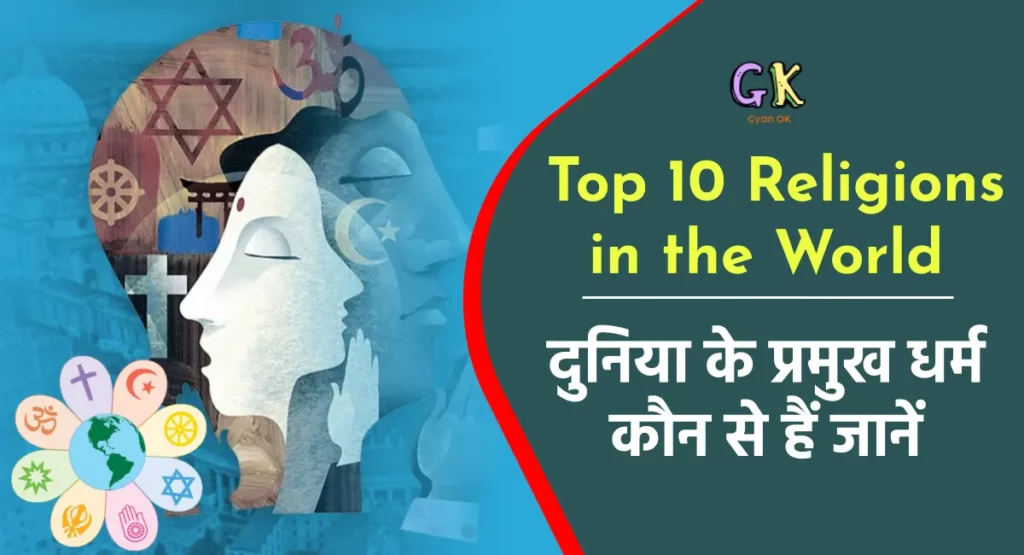In today’s diverse and interconnected world, understanding the various belief systems that shape societies is essential. Religion plays a significant role in shaping cultures, traditions, and worldviews. From the ancient practices of Hinduism to the monotheistic teachings of Islam, the spectrum of religious beliefs is vast and fascinating. This comprehensive article delves into the top 10 religions in the world, offering a detailed exploration of their origins, beliefs, and global impact.

Christianity
Origin: Middle East
Founder: Jesus Christ
Followers: Over 2.3 billion worldwide
Sacred Texts: Bible
Christianity, the largest religion globally, finds its roots in the teachings of Jesus Christ, who lived in the Middle East around two millennia ago. At the core of Christianity is the belief that Jesus is the Son of God and the saviour of humanity. The Bible, comprising the Old Testament and the New Testament, serves as the foundational text for Christians. The faith encompasses a diverse range of denominations, each with its interpretations and practices. Central tenets include love, forgiveness, and salvation through faith in Jesus. Christianity’s profound influence spans art, ethics, philosophy, and societies around the world.
Islam
Origin: Arabia (Middle East)
Founder: Prophet Muhammad
Followers: Over 1.9 billion worldwide
Sacred Text: Quran
Islam, a major global religion, traces its beginnings to the Arabian Peninsula in the 7th century through the teachings of Prophet Muhammad. The cornerstone of Islam is the belief in the oneness of God (Allah in Arabic) and Muhammad as His final prophet. The Quran, the holy book of Islam, provides guidelines for a righteous life, encompassing acts of worship, social justice, and ethical conduct. The Five Pillars of Islam, including prayer, fasting, almsgiving, pilgrimage, and declaration of faith, underscore devotion to God and moral responsibility. With over 1.9 billion followers, Islam’s influence spans continents and cultures, shaping societies and norms.
Hinduism
Origin: Indian Subcontinent
Founder: No specific founder (fusion of beliefs)
Followers: Approximately 1.2 billion worldwide
Sacred Texts: Vedas, Upanishads, Bhagavad Gita
Hinduism, the world’s oldest religion, has evolved over centuries in the Indian Subcontinent. It encompasses a rich tapestry of beliefs, rituals, and philosophies. Central to Hinduism is the concept of dharma (righteous duty), karma (cause and effect), and moksha (liberation from the cycle of rebirth). The religion celebrates a multitude of deities, reflecting the diversity of the faith. Hindu practices range from meditation and yoga to elaborate ceremonies and festivals. With approximately 1.2 billion adherents, Hinduism’s influence extends beyond India to various parts of the world.
Buddhism
Origin: Indian Subcontinent
Founder: Siddhartha Gautama
Followers: Around 520 million worldwide
Sacred Texts: Sutta Pitaka, Vinaya Pitaka, Abhidhamma Pitaka
Buddhism, originating in the Indian Subcontinent, centres on the teachings of Siddhartha Gautama, known as the Buddha. At the heart of Buddhism is the Four Noble Truths, which address the nature of suffering and the path to liberation (nirvana). Buddhists strive to follow the Eightfold Path, a set of ethical and mental guidelines leading to enlightenment. Meditation, mindfulness, and compassion are integral to Buddhist practice. With around 520 million followers, Buddhism’s impact extends across Asia and beyond, influencing philosophy, art, and spiritual practices.
Chinese Traditional Religion
Origin: China
Founder: No specific founder (fusion of beliefs)
Followers: Difficult to quantify due to diverse practices
Sacred Texts: Confucian canon, Classic of Filial Piety
Chinese Traditional Religion, deeply rooted in China’s history, emphasizes harmony with nature and ancestral reverence. It involves belief in a pantheon of deities, spirits, and cosmic forces. Practices include rituals, offerings, and ceremonies to maintain balance and auspicious outcomes. Ancestral worship and the veneration of nature are central aspects of this belief system. While challenging to estimate followers due to its varied practices, Chinese Traditional Religion continues to shape cultural norms and values in China.
African Traditional Religion
Origin: Africa
Founder: No specific founder
Followers: Varied due to diverse practices
Sacred Texts: No sacred texts (oral traditions and symbolic language)
African Traditional Religion encompasses a diverse array of indigenous beliefs and practices across the African continent. With origins in various African cultures, it often involves rituals, dances, and connections to ancestral spirits. The diversity of African landscapes and cultures is reflected in the multifaceted nature of these beliefs. Oral traditions and symbolism are central to passing down knowledge and spiritual practices. Followers vary across regions due to the localized and varied nature of the faith.
Sikhism
Origin: Indian Sub-Continent
Founder: Guru Nanak
Followers: Around 26 million worldwide
Sacred Texts: Guru Granth Sahib, Dasam Granth
Sikhism, founded by Guru Nanak in the Indian Sub-Continent, emphasizes equality, social justice, and devotion to one Creator. Sikhs believe in the oneness of God and the importance of living a righteous life. The Guru Granth Sahib, the central scripture, contains teachings promoting humility, compassion, and selfless service. The Five Ks, including uncut hair and a steel bracelet, symbolize Sikh identity. With around 26 million followers globally, Sikhism’s influence resonates with its commitment to equality and humanitarian values.
Spiritism
Origin: France
Founder: Hippolyte Léon Denizard Rivail (Allan Kardec)
Followers: Predominantly in Brazil and various countries
Sacred Texts: Spiritist Codification
Spiritism, originating in France in the 19th century, focuses on communication with spirits, reincarnation, and the immortal nature of the soul. Central to Spiritism is the belief in an afterlife and the idea that spirits can communicate with the living through mediums. The Spiritist Codification by Allan Kardec outlines the faith’s principles. Predominantly practised in Brazil and other countries, Spiritism has gained followers who seek insights into the spiritual realm and a deeper understanding of life’s mysteries.
Judaism
Origin: The Levant (Middle East)
Founder: Abraham
Followers: Approximately 14 million worldwide
Sacred Texts: Hebrew Bible
Judaism, one of the oldest Abrahamic religions, traces its roots to the Middle East with the covenant between God and Abraham. The faith is built upon the Hebrew Bible (Tanakh) which contains the Torah, Prophets, and Writings. Central tenets include monotheism, ethical conduct, and the pursuit of justice. Rituals, observances, and community play pivotal roles in Jewish life. With around 14 million adherents worldwide, Judaism’s enduring influence spans cultural, religious, and historical spheres.
Bahá’í Faith
Origin: Iran
Founder: Baháʼu’lláh
Followers: Globally distributed as minorities
Sacred Texts: Baháʼí literature
The Bahá’í Faith, founded in the mid-19th century by Baháʼu’lláh in Iran, emphasizes the unity of humanity and the oneness of God. Core principles include the elimination of prejudice, the harmony of science and religion, and the need for global governance. Bahá’ís strive to contribute to the betterment of society and advocate for universal education. With followers dispersed as minorities worldwide, the Bahá’í Faith’s message of unity and social progress continues to resonate globally.





